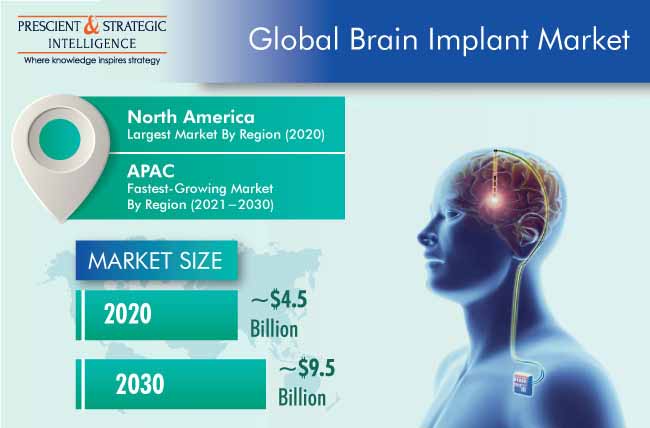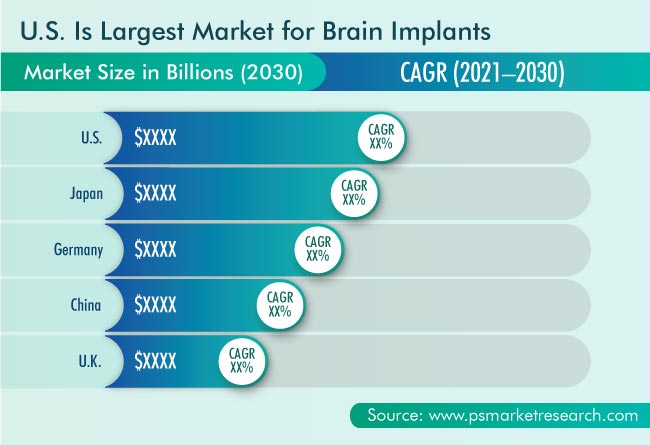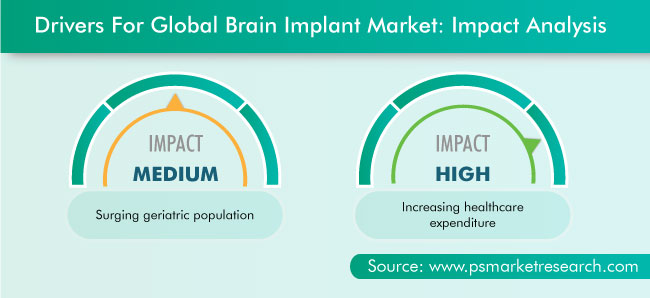Report Code: 12192 | Available Format: PDF
Brain Implant Market Research Report: By Type (Deep Brain Stimulation, Spinal Cord Stimulation, Vagus Nerve Stimulation), Application (Chronic Pain, Epilepsy, Parkinson-™s Disease, Depression, Essential Tremor, Alzheimer-™s Disease)- Global Industry Revenue Estimation and Demand Forecast to 2030
- Report Code: 12192
- Available Format: PDF
- Report Description
- Table of Contents
- Market Segmentation
- Request Free Sample
Market Overview
The global brain implant market was valued around $4.5 billion in 2020. The major factors contributing to the growth of the market are the increasing cases of neurological disorders, such as Alzheimer’s, epilepsy, Parkinson’s, and essential tremors; rising healthcare expenditure, growing geriatric population worldwide, and surging number of people with depression.
As a result of the COVID-19 pandemic, governments in a number of nations have enforced lockdowns and social distancing measures to safeguard the public and break the infection chain. Owing to this, the economy of most of the nations has been severely affected. Though there is an increase in the healthcare expenditure presently, most of the resources are diverted to COVID response. This has shifted the focus from other healthcare services, thereby negatively impacting the global market for brain implant.

Due to Its Ability to Reduce Symptoms, Deep Brain Stimulation Devices Held Largest Share in Market
The deep brain stimulation category held the largest share in the brain implant market in 2020, based on type. This was majorly due to the several advantages of deep brain stimulation over other therapies, such as the reduction in the degree of stiffness, slowness, and walking difficulties caused by different neurological illnesses, such as dystonia, Parkinson's disease, and essential tremor. Patients who have not responded to medication for at least five years are often advised to try this treatment.
Due to Its Increasing Prevalence of Neurological Disorders, Chronic Pain Category Will Be Fastest Growing
The chronic pain category is set to be the fastest growing in the market during the forecast period, based on application. This will mainly be due to the increasing incidences of chronic pain among patients suffering from neurological disorders.
Due to Rising Incidence of Neurological Disorders, North America To Hold Largest Share
Geographically, North America is expected to lead the market for brain implant during the forecast period. This will primarily be due to an increase in the elderly population, technical developments in brain implants, presence of a large number of market players, and rising frequency with which new products are being approved. Furthermore, the rising cases of neurological illnesses, as well as the increasing expenditure on brain implant devices, will be the important factors driving the growth of the brain implant market in the future.
Due to Increasing Need for Long-Term Treatment, Asia-Pacific (APAC) To Witness Fastest Growth
Geographically, the APAC region is expected to grow fastest in the market during the forecast period. This will majorly be due to the increasing investments because of the lack of long-term treatment solutions for neurodegenerative and psychiatric disorders. Moreover, the healthcare infrastructure is rapidly improving, along with the affordability of the procedures, thus contributing to the growth of the market.

Product Approvals and Launches Are Key Market Trends
Globally, the brain implant market has witnessed a considerable number of product approvals during the last decade. For instance, in December 2020, the Food and Drug Administration (FDA) approved Boston Scientific Corporation's fourth-generation Vercise PC and Vercise Gevia deep brain stimulation devices. These implantable devices provide low-intensity electrical pulses to the nerve regions in the brain, by varying the amplitude, pulse width, and frequency. When medicine does not manage the signs and symptoms of advanced levodopa-responsive Parkinson's disease, patients utilize these systems as an extra treatment.

Increasing Aging Population Is Boosting Market Growth
The increasing life expectancy and falling death rate are the major contributors to the growth in the geriatric population. According to the United Nations, globally, the proportion of the population aged 65 and above climbed from 6% in 1990 to 9% in 2019. This number is expected to further surge to 16% by 2050. The elderly require extensive care since they are more susceptible to neurological illnesses, such as Alzheimer's, epilepsy, Parkinson's, and essential tremors, as well as depression. Thus, the booming elderly population contributes significantly to the demand for improved brain implant technologies.
Growing Awareness about Neurological Diseases and Their Treatment Driving Market
Due to the various measures undertaken by for-profit and not-for-profit healthcare organizations across the world, the awareness of mental disorders has grown. The World Health Organization (WHO) has designated October 10th as World Mental Health Day in order to raise awareness on the various related illnesses, reduce stigma, promote access to services, and educate people about various treatment choices. Similarly, in the U.S., the National Alliance on Mental Illness (NAMI), a mental health organization active in treatment, support, research, and raising awareness about mental diseases, was founded in 1979 to offer support and psychoeducation to enhance the lives of those suffering from mental illnesses. Such initiatives are propelling the demand for brain implant devices.
| Report Attribute | Details |
Historical Years |
2015-2020 |
Forecast Years |
2021-2030 |
Base Year (2020) Market Size |
~$4.5 Billion |
Market Size Forecast in 2030 |
~$9.5 Billion |
Report Coverage |
Market Trends; Revenue Estimation and Forecast; Segmentation Analysis; Regional Breakdown; Companies’ Strategic Developments; Product Benchmarking; Company Profiling |
Market Size by Segments |
By Type; By Application; By Region |
Market Size of Geographies |
China; India; Japan; South Korea; Australia; U.S.; Canada; Mexico; Brazil; Germany; U.K.; France; Spain; Italy; Saudi Arabia; South Africa; |
Secondary Sources and References (Partial List) |
Centers for Disease Control and Prevention (CDC); International Agency for Research on Cancer (IARC); World Health Organization (WHO); International Osteoporosis Foundation (IOF); International Diabetes Federation (IDF) |
Explore more about this report - Request free sample
Market Players Are Focusing on Product Launches to Gain Competitive Edge
Some of the key players operating in the global brain implant market are Medtronic plc, Abbot Laboratories, Boston Scientific Corporation, Inspire Medical Systems Inc., NeuroPace Inc., Nevro Corporation, Synapse Biomedical Inc., and Aleva Neurotherapeutics
In recent years, players in the industry have engaged in product launches to offer a better portfolio than their competitors.
- In January 2021, Abbott Laboratories launched the NeuroSphere myPath, a digital health app designed to track and report patients’ general well-being associated with spinal cord stimulation or dorsal root ganglion (DRG) therapy.
Key Players in Brain Implant Market Include:
-
Medtronic plc
-
Abbot Laboratories
-
Inspire Medical Systems Inc.
-
Boston Scientific Corporation
-
NeuroPace Inc.
-
Nevro Corporation
-
Synapse Biomedical Inc.
-
Aleva Neurotherapeutics SA
Market Size Breakdown by Segment
The global brain implant market report offers comprehensive market segmentation analysis along with market estimation for the period 2015–2030.
Based on Type
- Deep Brain Stimulation
- Spinal Cord Stimulation
- Vagus Nerve Stimulation
Based on Application
- Chronic Pain
- Epilepsy
- Parkinson’s Disease
- Depression
- Essential Tremor
- Alzheimer’s Disease
Geographical Analysis
- North America
- U.S.
- Canada
- Europe
- Germany
- France
- U.K.
- Italy
- Spain
- Asia-Pacific (APAC)
- Japan
- China
- India
- Australia
- South Korea
- Latin America (LATAM)
- Brazil
- Mexico
- Middle East and Africa (MEA)
- Saudi Arabia
- South Africa
The value of the brain implant market was around $4.5 billion in 2020.
The brain implant market will reach around $9.5 billion revenue by 2030.
Product approvals and launches are the major trends currently being witnessed in the market for brain implants.
North America will hold the largest share in the market for brain implants between 2021 and 2030.
The mushrooming geriatric population and growing public awareness about neurological diseases and their treatments are the major factors driving the expansion of the market for brain implants.
Want a report tailored exactly to your business strategy?
Request CustomizationWant an insight-rich discussion with the report author?
Speak to AnalystOur dedication to providing the most-accurate market information has earned us verification by Dun & Bradstreet (D&B). We strive for quality checking of the highest level to enable data-driven decision making for you
Our insights into the minutest levels of the markets, including the latest trends and competitive landscape, give you all the answers you need to take your business to new heights
With 24/7 research support, we ensure that the wheels of your business never stop turning. Don’t let time stand in your way. Get all your queries answered with a simple phone call or email, as and when required
We take a cautious approach to protecting your personal and confidential information. Trust is the strongest bond that connects us and our clients, and trust we build by complying with all international and domestic data protection and privacy laws